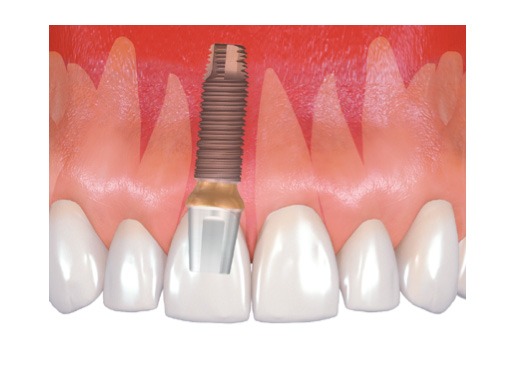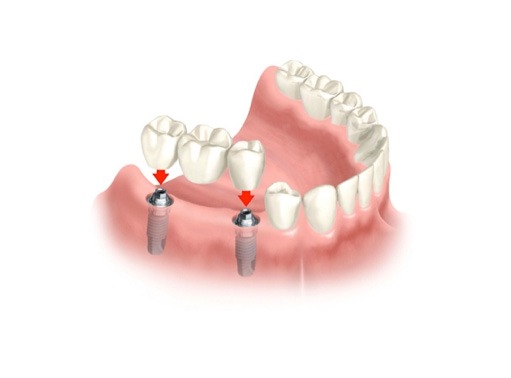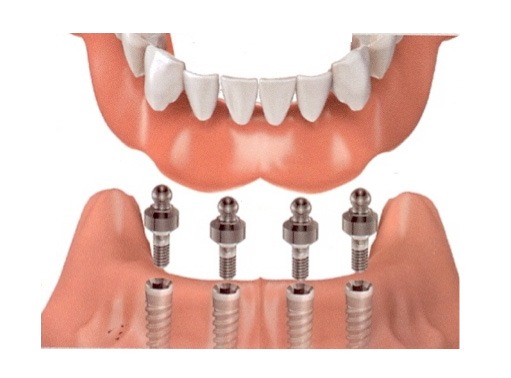If you need any additional information, please call us


| Monday – Friday: | 9am – 7pm |
| Saturday: | 9am – 1pm |
| Sunday: | Closed |
| Mon - Wed - Fri: | 9am – 3pm |
| Tues - Thur: | 12pm – 7pm |
| Every second Saturday: | 9am – 1pm |
| Sunday: | Closed |
We specialize in placing dental implants near me, bridges, and dentures of implants. We guarantee the best treatment with our dentists and specialists in one place.
Lemont Dental Clinic
Gentle Touch Dentistry



CONSIDERATIONS FOR DENTAL IMPLANTS NEAR ME CANDIDATES
THE DENTAL IMPLANT TREATMENT PROCEDURE
POST-TREATMENT
Implants look and behave like natural teeth. Because of their construction, they are connected to the bone permanently.
A loose prosthesis may become unstable in the mouth, causing lisping and slurred speech. Implants allow you to speak fluently without worrying about your prosthesis falling out.
Thanks to a permanent connection with the bone (osseointegration), implants eliminate the discomfort of removable dentures. Eating is made easier! Biting with the removable denture might be difficult or sometimes impossible. Implants closely resemble your natural teeth, letting you enjoy favorite meals with confidence and without pain.
Removable dentures are just that removable! Implants eliminate the problematic and awkward removing of dentures. As well as a need to use prosthetic glues to keep the denture in place.
Implants do not require tooth preparation like bridges; therefore, neighboring teeth are not modified in any way in order to support the implant. Your teeth remain untouched, which is crucial for preserving better oral health. Single implants also allow better access to interproximal spaces, making oral hygiene easier to maintain.
The jawbone should be fully matured at the time of implant placement. Implants are therefore usually recommended for people l8 years of age and older. The status of the bone’s development can be confirmed by your dentist via an x-ray examination.
On the other hand, there is no maximum age limit to receive implant treatment. Your dentist will inform you of any risks based on their assessment of your dental and general health.
The cost of your treatment will depend on the extent of the procedure(s) you will need. After a thorough examination of your individual clinical situation, your dentist will be able to review the various steps of the recommended procedure as well as the associated costs.
Something to keep in mind is that while the initial cost of an implant procedure could be higher than an alternative crown and bridge procedure, the life-expectancy of an implant is usually much longer and does not require the need to compromise other healthy teeth, which is an added value of implant treatment and can prove to be more cost-effective over time.
In most cases, if the disease is managed, implant treatment is still a viable option. However, you should inform your dentist of your medical history and any other current medico! conditions and/ or diseases. Your dentist will review everything in detail before determining if you are a candidate for implants.
In some cases, side effects of medications may affect the healing process, so your dentist should also be informed of any medications that you are taking.
After the healing phase, a properly placed and restored, high-quality implant supported by a good oral hygiene routine can last a lifetime.
The gum will probably be sensitive in the first few days after the procedure but will not bleed any more. Your cheek may swell for a short time and may feel uncomfortable. However, most patients will not even need a painkiller on the following day and can return to normal life.
The jawbone should be fully matured at the time of implant placement. Implants are therefore usually recommended for people l8 years of age and older. The status of the bone’s development can be confirmed by your dentist via an x-ray examination.
On the other hand, there is no maximum age limit to receive implant treatment. Your dentist will inform you of any risks based on their assessment of your dental and general health.
The cost of your treatment will depend on the extent of the procedure(s) you will need. After a thorough examination of your individual clinical situation, your dentist will be able to review the various steps of the recommended procedure as well as the associated costs.
Something to keep in mind is that while the initial cost of an implant procedure could be higher than an alternative crown and bridge procedure, the life-expectancy of an implant is usually much longer and does not require the need to compromise other healthy teeth, which is an added value of implant treatment and can prove to be more cost-effective over time.
In most cases, if the disease is managed, implant treatment is still a viable option. However, you should inform your dentist of your medical history and any other current medico! conditions and/ or diseases. Your dentist will review everything in detail before determining if you are a candidate for implants.
In some cases, side effects of medications may affect the healing process, so your dentist should also be informed of any medications that you are taking.
After the healing phase, a properly placed and restored, high-quality implant supported by a good oral hygiene routine can last a lifetime.
The gum will probably be sensitive in the first few days after the procedure but will not bleed any more. Your cheek may swell for a short time and may feel uncomfortable. However, most patients will not even need a painkiller on the following day and can return to normal life.
Allergies to metal are very rare, and dental implants are made of titanium, which is a metal that is well-accepted by the body. If you have any concerns, you should discuss them with your dentist.
No. Because implants are not magnetic, they do not set off metal detectors.
No. Implants have no electromagnetic effect, and therefore, do not affect the operation of your pacemaker in any way.
Like most products, implant options can range from being low to very high in quality. For example, differences in implant design, surface and even shape can have an impact on the maintenance of bone and soft tissue around the implant over time.
Where and how an implant is manufactured can also vary in quality. It is also important to note that some implant systems are backed by extensive scientific research and documentation, while others have very minimal clinical evidence or data to confirm their results. These are some important considerations you may want to ask your doctor about in order to understand what implant brand they will be using for your core.
The placement of an implant is considered a minor surgical procedure. But as with all procedures, complications and side effects, while uncommon, are possible.
Speak with your dental care provider to understand their experience with providing implant therapy and to get the details on risks and other considerations.
In addition to the other health risks, the long-term success rate of implants can be compromised by smoking. It is recommended that you speak with your dentist to determine if implants are a viable solution for you.
Allergies to metal are very rare, and dental implants are made of titanium, which is a metal that is well-accepted by the body. If you have any concerns, you should discuss them with your dentist
No. Because implants are not magnetic, they do not set off metal detectors.
No. Implants have no electromagnetic effect, and therefore, do not affect the operation of your pacemaker in any way.
Like most products, implant options can range from being low to very high in quality. For example, differences in implant design, surface and even shape can have an impact on the maintenance of bone and soft tissue around the implant over time.
Where and how an implant is manufactured can also vary in quality. It is also important to note that some implant systems are backed by extensive scientific research and documentation, while others have very minimal clinical evidence or data to confirm their results. These are some important considerations you may want to ask your doctor about in order to understand what implant brand they will be using for your core.
The placement of an implant is considered a minor surgical procedure. But as with all procedures, complications and side effects, while uncommon, are possible.
Speak with your dental care provider to understand their experience with providing implant therapy and to get the details on risks and other considerations.
In addition to the other health risks, the long-term success rate of implants can be compromised by smoking. It is recommended that you speak with your dentist to determine if implants are a viable solution for you.
The total length of your implant procedure will depend on the number of implants you are receiving and what other procedures (e.g. bone grafting) are required.
Following a thorough examination, your dentist will be able to provide you with further information about the approximate length of your treatment.
In most cases, only local anesthesia is necessary for an implant procedure.
However, if you have any concerns or specific preferences, you should discuss them with your dentist to determine the best solution for you.
Bone grafting is a surgical procedure that is often required if the quantity and/or quality of your jawbone is not sufficient for the implant being placed.
If you require bone grafting, your dentist will review your options with you, as well as what the procedure will entail.
Depending on the condition of the extraction site and considerations such as bone quality and quantity, it is possible for an implant to be placed immediately following a tooth extraction. This is referred to as “immediate implant placement.”
The standard protocol for implant-supported crowns or bridges most often includes a healing phase where there is no force (load) on the implant immediately after it is placed. In these situations, space left by the missing tooth is temporarily restored with a traditional temporary denture, which is usually attached to the neighboring teeth.
However, in immediate loading, new implant systems and methods are used that under specific conditions allow the denture or the temporary denture to be attached to the implants immediately. Patients receive their implant and have fixed, natural! looking teeth on the same day. Whether immediate loading is suitable for you will depend on the state of the jawbone and the position of the implants. Ask your dentist about the options.
Depending on the condition of your existing denture, it may be possible to have it modified to work with the implants. After evaluation of clinical condition and existing denture, your dentist will be able to review with you your treatment options.
As with the maintenance of your natural teeth, routine check-ups and cleaning are a critical part of caring for your new implant-supported tooth/teeth to help eliminate the risk of bacteria, which could lead to the loss of an implant.
This can be avoided with regular professional dental cleaning to supplement your daily regimen of routine brushing and flossing. Your dental care provider will give you specific aftercare instructions, which should be carefully followed.
Regardless of whether you have an implant-supported crown, bridge or denture, you will be able to eat, speak and smile again with confidence.
Unlike traditional dentures that rely on messy adhesives, implant-supported dentures are firmly attached to your implants for optimized function.
While it is recommended that a conventional denture be removed at night because it may come loose during sleep, an implant-supported denture is more securely fixed in place and can be left in place at night.
Depending on the type implant-supported overdenture that you have, specific aftercare may be required, which your doctor will review with you.
The days needed to recover from implant surgery varies depending on the procedure and individual patient situation.
In many cases, implant patients have returned to work as soon as the next day. Your dentist can provide specific guidance based on your individual need.
Exercise after implant placement is not a problem. However, if you take part in activities involving vigorous movement immediately following your surgery, you should first consult with your dentist.